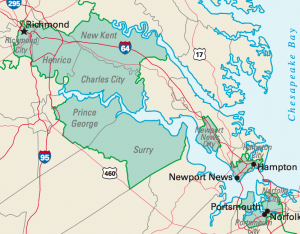By Peter Galuszka
A panel of federal judges in Richmond has scrambled the carefully laid plans of legislators, most of them Republicans, to pack African-American voters into one congressional district to give the GOP an advantage in some of the state’s 10 other districts.
The panel of U.S. District Court judges decreed that the General Assembly’s 2012 decision to draw new boundaries in the 3rd Congressional District stretching from Richmond east to several Tidewater cities was in error.
The state has until next April to redraw the 3rd District, now represented by U.S. Rep. Robert C. “Bobby” Scott, a Democrat who is the state’s only African American congressman.
That will undoubtedly impact other districts represented by white Republicans including U.S. Rep. Randy Forbes of the 4th District, U.S. Rep. Scott Ringell of the 2nd District and Robert J. Whitman of the 1st District.
This is indeed an interesting start to what could end up being a messy line of dominoes falling. And it shows just how wrongheaded politicians are when they tinker with voters by race by packing people of color in one district so races in other ones will be decidedly less competitive.
It also raises other questions about ways the GOP is doing its best to minimize the influence of young and non-white voters through the use of voter identification cards and other means.
To get an idea of how nuts the 3rd District is, look at a map. Moving west to east, it goes through eastern Richmond and Henrico County, swoops down the James River peninsula, and hop-scotches parts of the 1st District to include heavily African-American parts of Newport News and Hampton. Then, the District crosses Hampton Roads to include heavily black parts of Norfolk and Portsmouth and then heads west again to take also-black parts of counties on the south shore of the James River.
This scheme packs African-Americans into one unit while mostly-white parts of Virginia Beach, Norfolk and Chesapeake and Williamsburg are covered in the 1st, 2nd and 4th Districts, all represented by white Republicans. Mostly-black Petersburg, a city of 32,000, was taken out of the 4th District and put in Scott’s 3rd District, giving white Republican Forbes of the 4th District an advantage.
Democrats such as State Sen. Mamie Locke have long complained about schemes that hop-scotch geography to give white candidates an advantage. They want tighter, more contiguous districts.
One can tell just how serious this is when Del. William Howell, the Republican House Speaker, had nothing to say about the court’s decision. He will have to somehow help navigate drawing up new district plans.
He’s really under the gun. He can’t just set up a road block as he did with Medicaid expansion and tell Democratic Gov. Terry McAuliffe where to stick it. If Howell shuns a bipartisan effort, then McAuliffe would likely veto whatever he and his colleagues come up with. Then it would go back to the judges to decide.
It is in Virginia’s interest to make sure all of its districts and not just ones for Congress are shaped to allow for more competitive races. Very few elections for state positions are contested. This, in turn, ruins bipartisan consensus and makes the primaries, usually for Republicans, more consequential than the races themselves. The results are either legislative gridlock or laws that have little to do with the wishes of many voters.
Another issue that needs to be addressed is what Mother Jones magazine has identified as a large-scale, national effort, mostly by Republicans, to make it harder for minorities and young people to vote. They tend to vote Democratic and helped Barack Obama win the presidency in 2008 and in 2012.
Since 2012, 22 states have passed new voting restriction laws that shorten voting hours or require a government-issued identification card or proof of citizenship. North Carolina has perhaps the worst of such measures. There are shorter hours and no more same-day registration to vote. It even gives the nod to “poll watchers” who can stand around outside polling places and hassle voters about their eligibility to vote. I guess that means if you look black or Hispanic or youthful, you get rousted by vigilantes. The odd part is that states, including Virginia, went for more restriction when there wasn’t much evidence of voter fraud.
To be sure, Virginia’s redistricting efforts were begun by federal initiatives such as the Voting Rights Act which gave Bobby Scott an opportunity to win as an African-American in the early 1990s. The Voting Rights Act was meant to ensure that minorities were represented but that concept has been cynically morphed into a Frankenstein that keeps minorities “packed” in a district or districts so whites maintain their hold on most of the other districts in a state.
The court’s decision is most welcome. Let’s hope it grows into a movement to return democratic competition and ends undemocratic restrictions like demanding extra and unnecessary pieces of identification for qualified voters.




